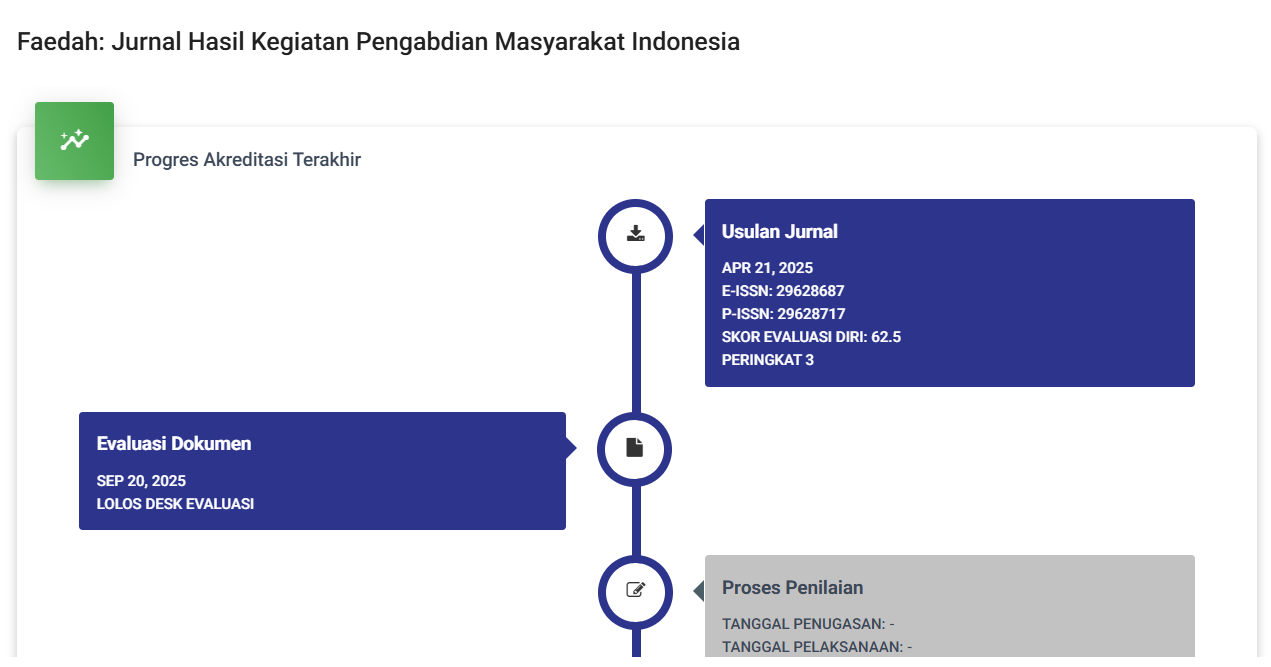Pendampingan Kemandirian Anak dalam Kewirausahaan di Lembaga Kesejahteraan Sosial Anak (LKSA) Kedungturi Sidoarjo
DOI:
https://doi.org/10.59024/faedah.v2i4.1107Keywords:
Children's Entrepreneurship Assistance, Children's Economic Independence, Child Social Welfare Institutions (LKSA)Abstract
Independence and life skills are needed in a social welfare institution; Al-amin's children (LKSA) have only been able to survive by depending on financial sources from the provision of Zakat, Infaq and Sadaqah from the Benefactors. Independence and life skills in the form of entrepreneurial skills will form a mature entrepreneurial spirit in the children who are in a dormitory which will ultimately lead them to independent living and can even make life easier for the institution where they live. A weak spirit of independence is experienced at the Al-Amin Child Welfare Institution (LKSA), Kedungturi Taman Sidoarjo Village. As productive young people, children in orphanages should have the potential to develop better, but due to limited entrepreneurial knowledge they have they have not been able to develop optimally. This program aims to create independent young entrepreneurs who are able to create business opportunities for orphanages and the surrounding community. The results achieved in the Science and Technology for Society program are making creatively designed stitches and unique shirts, increasing children's resources so they are able to produce, mastering effective marketing strategies and mastering business management.
References
Depdiknas. Buku Saku: Kurikulum Tingkat Satuan Pendidikan (KTSP) Sekolah Menengah Pertama. Jakarta: Direktorat Pembinaan SMP, Ditjen Mandikdasmen, Depdiknas. (2006).
DepdiknasPelayanan Bimbingan dan Konseling. Jakarta: Puskur, Balitbang- Depdiknas. . (2003).
Firdaus, N. (2018). Pengentasan kemiskinan melalui pendekatan kewirausahaan sosial. Jurnal Ekonomi dan Pembangunan, 22(1), 55-67.
IFFINA.,., Momentum Penting Pertumbuhan Industri Kreatif Guna Mendorong Arus, Investasi di Indonesia., Press Release untuk press conference 11 Maret 2009.
Irmawati, D. (2011). Pemanfaatan e-commerce dalam dunia bisnis. Jurnal Ilmiah Orasi Bisnis, 6, 95-112.
Mamat Supriatna, dkk. (2005). Konsep Pendidikan Berorientasi Kecakapan Hidup di Sekolah Menengah Pertama. Jakarta: Depdiknas.
Nelson-Jones, R. (1997). Practical Counseling and Helping Skills, Texts and Exercises for the Life Skills Counseling Model. Fourth Edition. London: British Library Cataloging in Publication Data.
Nugraha, A. E. P., & Wahyuhastuti, N. (2017). Start up digital business: sebagai solusi penggerak wirausaha muda. Jurnal Nusantara Aplikasi Manajemen Bisnis, 2(1), 1-9.
Nurhafizah, N. (2018). Bimbingan awal kewirausahaan pada anak usia dini. Jurnal Konseling dan Pendidikan, 6(2), 62-67.
Prasetyo, A. (2018). Rasio Wirausaha Indonesia Sentuh 7%, Retrieved June 12, 2019 from https://mediaindonesia.com/read/detail/164639-rasio-wirausaha-indonesia-sentuh-7
Rahman, F., & Mawardi, M. K. (2017). Strategi UMKM dalam membangun brand toko online di marketplace (Studi pada komunitas tokopedia di Kota Bekasi). Jurnal Administrasi Bisnis, 53(1), 39-48.
Rahmawati, 2000, Pendidikan Wirausaha dalam Globalisasi, Liberty, Yogyakarta www.joomla.org
Sutono, Islamic Spiritual Entrepreneurship Dalam menumbuhkan kesejahteraan Masyarakat Pesisir Ujung Pangkah dan Panceng Gresik. Surabaya: 2020.
Wicaksono, S. A., & Aminata, J. (2018). Analisis faktor–faktor yang mempengaruhipendapatan umkm pada marketplace online tokopedia, bukalapak, dan shopee. Semarang: Fakultas Ekonomika dan Bisnis.
Downloads
Published
How to Cite
Issue
Section
License
Copyright (c) 2024 Faedah : Jurnal Hasil Kegiatan Pengabdian Masyarakat Indonesia

This work is licensed under a Creative Commons Attribution-ShareAlike 4.0 International License.









